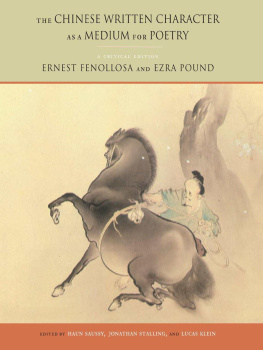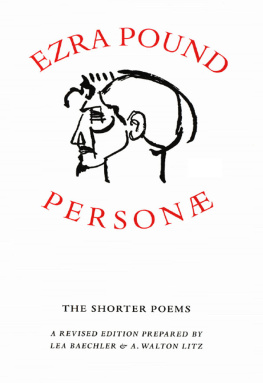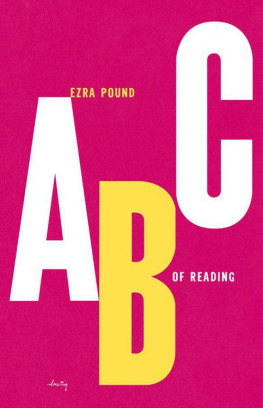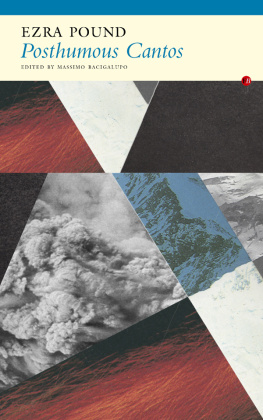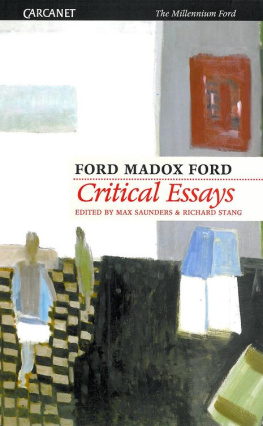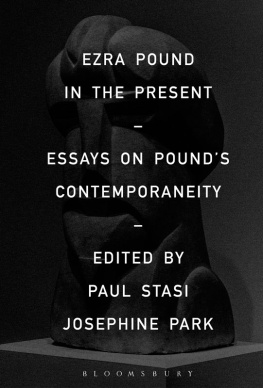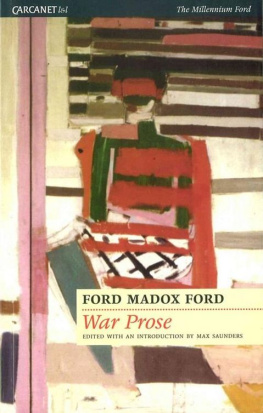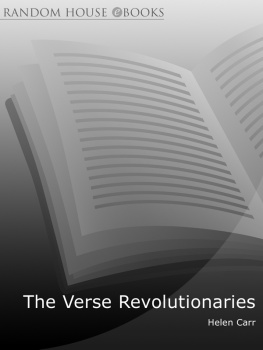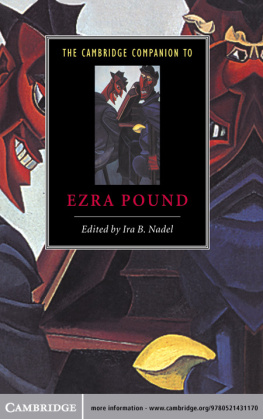Ezra Pound - Pavannes and Divisions
Here you can read online Ezra Pound - Pavannes and Divisions full text of the book (entire story) in english for free. Download pdf and epub, get meaning, cover and reviews about this ebook. year: 2011, publisher: Barnes & Noble, genre: Detective and thriller. Description of the work, (preface) as well as reviews are available. Best literature library LitArk.com created for fans of good reading and offers a wide selection of genres:
Romance novel
Science fiction
Adventure
Detective
Science
History
Home and family
Prose
Art
Politics
Computer
Non-fiction
Religion
Business
Children
Humor
Choose a favorite category and find really read worthwhile books. Enjoy immersion in the world of imagination, feel the emotions of the characters or learn something new for yourself, make an fascinating discovery.
- Book:Pavannes and Divisions
- Author:
- Publisher:Barnes & Noble
- Genre:
- Year:2011
- Rating:3 / 5
- Favourites:Add to favourites
- Your mark:
- 60
- 1
- 2
- 3
- 4
- 5
Pavannes and Divisions: summary, description and annotation
We offer to read an annotation, description, summary or preface (depends on what the author of the book "Pavannes and Divisions" wrote himself). If you haven't found the necessary information about the book — write in the comments, we will try to find it.
This eclectic 1918 volume of poetry, essays, reviews, dramatic dialogues, and short fiction is a brilliant hotchpotch of Pounds early writings. Among the contents are Dubliners and Mr. James Joyce and Troubadours: Their Sorts and Conditions, as well as the key modernist essays A Few Donts and Ford Madox Hueffer and the Prose Tradition in Verse.
Pavannes and Divisions — read online for free the complete book (whole text) full work
Below is the text of the book, divided by pages. System saving the place of the last page read, allows you to conveniently read the book "Pavannes and Divisions" online for free, without having to search again every time where you left off. Put a bookmark, and you can go to the page where you finished reading at any time.
Font size:
Interval:
Bookmark:
EZRA POUND

This 2011 edition published by Barnes & Noble, Inc.
All rights reserved. No part of this publication may be reproduced, stored in a retrieval system, or transmitted, in any form or by any means, electronic, mechanical, photocopying, recording, or otherwise, without prior written permission from the publisher.
Barnes & Noble, Inc.
122 Fifth Avenue
New York, NY 10011
ISBN: 978-1-4114-5347-0
JODINDRANATH MAWHWOR'S OCCUPATION
T HE soul of Jodindranath Mawhwor clove to the god of this universe and he meditated the law of the Shastras.
He was a man of moderate income inherited for the most part from his fathers, of whom there were several, slightly augmented by his own rather desultory operations of commerce. He had never made money by conquest and was inclined to regard this method of acquisition as antiquated; as belonging rather to the days of his favorite author than to our own.
He had followed the advice of the Sutras, had become the head of an house in the not unprosperous city of Migdalb, in a quarter where dwelt a reasonable proportion of fairly honest and honourable people not un-averse to gossip and visits. His house was situated by a watercourse, in lieu of new fangled plumbing, and in this his custom was at one with that of the earliest Celts. It was divided in various chambers for various occupations, surrounded by a commodious garden, and possessed of the two chief chambers, the "exterior" and the "interior" (butt and ben). The interior was the place for his women, the exterior enhanced with rich perfumes, contained a bed, soft, luscious, and agreeable to the action of vision, covered with a cloth of unrivalled whiteness. It was a little humped in the middle, and surmounted with garlands and bundles of flowers, which were sometimes renewed in the morning. Upon it were also a coverlet brightly embroidered and two cylindrical pillows, one at the head and the other placed at the foot. There was also a sort of sofa or bed for repose, at the head of which stood a case for unguents, and perfumes to be used during the night, and a stand for flowers and pots of cosmetic and other odoriferous substances, essences for perfuming the breath, new cut slices of lemon peel and such things as were fitting. On the floor near the sofa rested a metal spittoon, and a toilet case, and above it was a luth suspended from an elephant's tusk, uncut but banded with silver. There was also a drawing table, a bowl of perfume, a few books, and a garland of amaranths. Further off was a sort of round chair or tabouret, a chest containing a chess board, and a low table for dicing. In the outer apartment were cages for Jodindranath's birds. He had a great many too many. There were separate small rooms for spinning, and one for carving in wood and such like dilettantismes. In the garden was a sort of merry-go-round of good rope, looking more or less like a May-pole. There was likewise a common see-saw or teeter, a green house, a sort of rock garden, and two not too comfortable benches.
Jodindranath rose in the morning and brushed his teeth, after having performed other unavoidable duties as prescribed in the sutra, and he applied to his body a not excessive, as he considered it, amount of unguents and perfumes. He then blackened his eyebrows, drew faint lines under his eyes, put a fair deal of rouge on his lips, and regarded himself in a mirror. Then having chewed a few betel leaves to perfume his breath, and munched another bonne-bouche of perfume, he set about his day's business. He was a creature of habit. That is to say, he bathed, daily. And upon alternate days he anointed his person with oil, and on the third day he lamented that the mossy substance employed by the earliest orthodox hindoos was no longer obtainable. He had never been brought to regard soap with complaisance. His conscience was troubled, both as to the religious and social bearing of this solidified grease. He suspected the presence of beef-suet; it was at best a parvenu and Mohametan substance. Every four days he shaved, that is to say, he shaved his head and his visage, every five or ten days he shaved all the rest of his body. He meticulously removed the sweat from his arm-pits. He ate three meals daily; in the morning, afternoon and at evening as is prescribed in the Charayana.
Immediately after breakfast he spent some time instructing his parrots in language. He then proceeded to cock-fights, quail-fights and ram-fights; from them to the classical plays, though their representations have sadly diminished. He slept some hours at mid-day. Then, as is befitting to the head of an house, he had himself arrayed in his ornaments and habiliment and passed the afternoon in talk with his friends and acquaintance. The evening was given over to singing. Toward the end of it Jodindranath, as the head of his house, retaining only one friend in his company, sat waiting in the aforementioned perfumed and well arranged chamber. As the lady with whom he was at that time connected did not arrive on the instant, he considered sending a messenger to reproach her. The atmosphere grew uneasy. His friend Mohon fidgeted slightly.
Then the lady arrived. Mohon, his friend, rose graciously, bidding her welcome, spoke a few pleasant words and retired. Jodindranath remained. And for that day, the twenty fifth of August 1916, this was his last occupation. In this respect the day resembled all others.
This sort of thing has gone on for thirty five hundred years and there have been no disastrous consequences.
As to Jodindranath's thoughts and acts after Mohon had left him, I can speak with no definite certainty. I know that my friend was deeply religious; that he modeled his life on the Shastras and somewhat on the Sutra. To the Kama Sutra he had given minute attention. He was firmly convinced that one should not take one's pleasure with a woman who was a lunatic, or leprous, or too white, or too black, or who gave forth an unpleasant odor, or who lived an ascetic life, or whose husband was a man given to wrath and possessed of inordinate power. These points were to him a matter of grave religion.
He considered that his friends should be constant and that they should assist his designs.
He considered it fitting that a citizen should enter into relations with laundrymen, barbers, cowmen, florists, druggists, merchants of betel leaves, cab-drivers, and with the wives of all these.
He had carefully considered the sizes and shapes and ancient categories of women; to wit, those which should be classified as she-dog, she-horse, and she-elephant, according to their cubic volume. He agreed with the classic author who recommends men to choose women about their own size.
The doctrine that love results either from continuous habit, from imagination, from faith, or from the perception of exterior objects, or from a mixture of some or all of these causes, gave him no difficulty. He accepted the old authors freely.
We have left him with Lalunmokish seated upon the bed humped in the middle. I can but add that he had carefully considered the definitions laid down in the Sutra; kiss nominal, kiss palpitant, kiss contactic, the kiss of one lip and of two lips (preferring the latter), the kiss transferred, the kiss showing intention. Beyond this he had studied the various methods of scratching and tickling, and the nail pressures as follows: sonorous, half moon and circle, peacock-claw, and blue-lotus.
He considered that the Sutra was too vague when it described the Bengali women, saying that they have large nails, and that the southern women have small nails, which may serve in diverse manners for giving pleasure but give less grace to the hand. Biting he did not much approve. Nor was he very greatly impressed with the literary tastes of the public women in Paraliputra. He read books, but not a great many. He preferred conversation which did not leave the main groove. He did not mind its being familiar.
Font size:
Interval:
Bookmark:
Similar books «Pavannes and Divisions»
Look at similar books to Pavannes and Divisions. We have selected literature similar in name and meaning in the hope of providing readers with more options to find new, interesting, not yet read works.
Discussion, reviews of the book Pavannes and Divisions and just readers' own opinions. Leave your comments, write what you think about the work, its meaning or the main characters. Specify what exactly you liked and what you didn't like, and why you think so.


